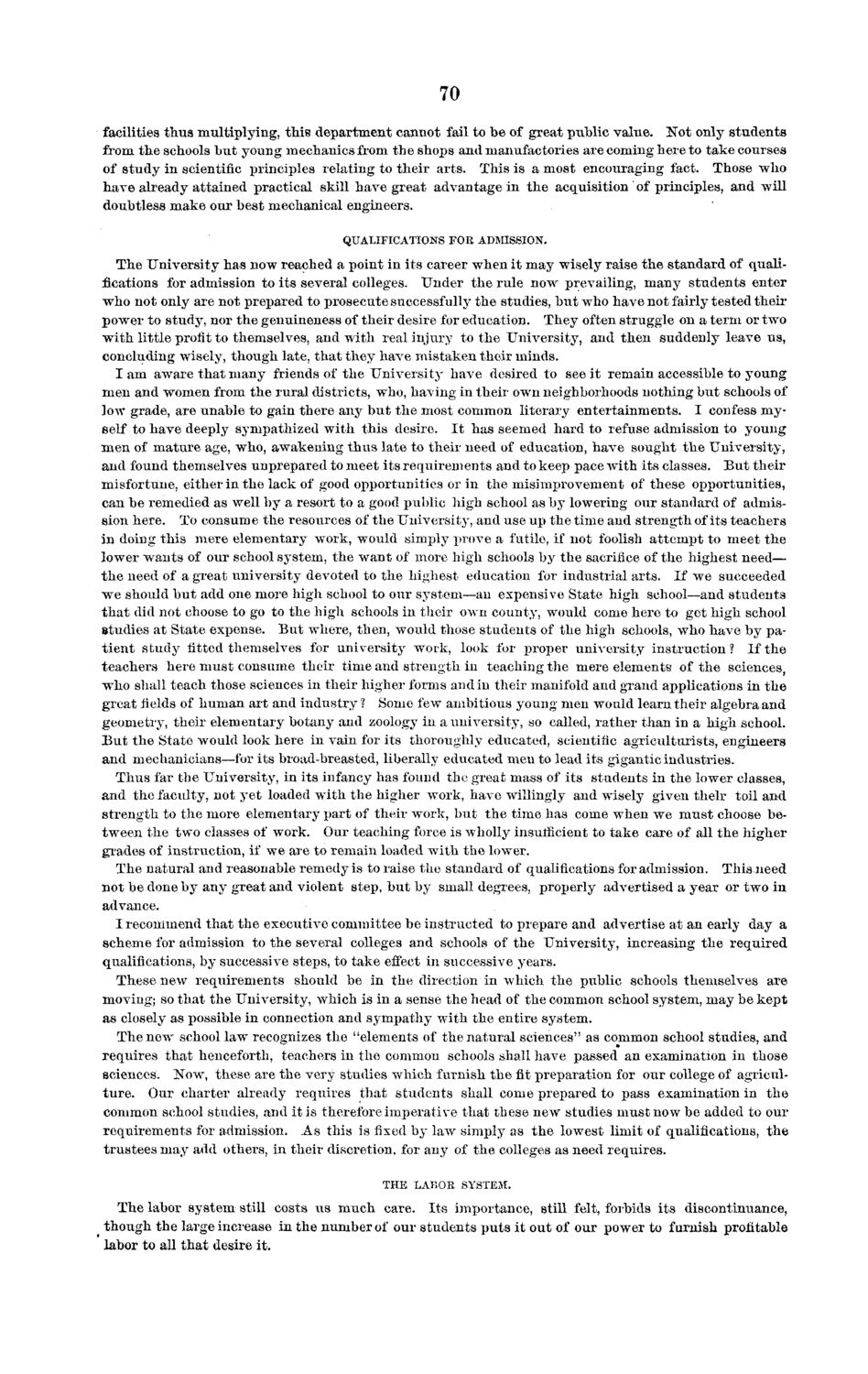| |
| |
Caption: Board of Trustees Minutes - 1872
This is a reduced-resolution page image for fast online browsing.

EXTRACTED TEXT FROM PAGE:
70 facilities thus multiplying, this department cannot fail to be of great public value. Not only students from the schools but young mechanics from the shops and manufactories are coming hereto take courses of study in scientific principles relating to their arts. This is a most encouraging fact. Those who have already attained practical skill have great advantage in the acquisition of principles, and will doubtless make our best mechanical engineers. QUALIFICATIONS FOR ADMISSION. The University has now reached a point in its career when it may wisely raise the standard of qualifications for admission to its several colleges. Under the rule now prevailing, many students enter who not only are not prepared to prosecute successfully the studies, but who have not fairly tested their power to study, nor the genuineness of their desire for education. They often struggle on a term or two with little profit to themselves, and with real injury to the University, and then suddenly leave us, concluding wisely, though late, that they have mistaken their minds. I am aware that many friends of the University have desired to see it remain accessible to young men and women from the rural districts, who, having in their own neighborhoods nothing but schools of low grade, are unable to gain there any but the most common literary entertainments. I confess myself to have deeply sympathized with this desire. I t has seemed hard to refuse admission to young men of mature age, who, awakening thus late to their need of education, have sought the University, and found themselves unprepared to meet its requirements and to keep pace with its classes. But their misfortune, either in the lack of good opportunities or in the misimprovement of these opportunities, can be remedied as well by a resort to a good public high school as by lowering our standard of admission here. To consume the resources of the University, and use up the time and strength of its teachers in doing this mere elementary work, would simply prove a futile, if not foolish attempt to meet the lower wants of our school system, the want of more high schools by the sacrifice of the highest need— the need of a great university devoted to the highest education for industrial arts. If we succeeded we should but add one more high school to our system—an expensive State high school—and students that did not choose to go to the high schools in their own county, would come here to get high school studies at State expense. But where, then, would those students of the high schools, who have by patient study fitted themselves for university work, look for proper university instruction ? If the teachers here must consume their time and strength in teaching the mere elements of the sciences, who shall teach those sciences in their higher forms and in their manifold and grand applications in the great fields of human art and industry ? Some few ambitious young men would learn their algebra and geometry, their elementary botany and zoology in a university, so called, rather than in a high school. But the State would look here in vain for its thoroughly educated, scientific agriculturists, engineers and mechanicians—for its broad-breasted, liberally educated men to lead its gigantic industries. Thus far the University, in its infancy has found the great mass of its students in the lower classes, and the faculty, not yet loaded with the higher work, have willingly and wisely given their toil and strength to the more elementary part of their work, but the time has come when we must choose between the two classes of work. Our teaching force is wholly insufficient to take care of all the higher grades of instruction, if we are to remain loaded with the lower. The natural and reasonable remedy is to raise the standard of qualifications for admission. This need not be done by any great and violent step, but by small degrees, properly advertised a year or two in advance. I recommend that the executive committee be instructed to prepare and advertise at an early day a scheme for admission to the several colleges and schools of the University, increasing the required qualifications, by successive steps, to take effect in successive years. These new requirements should be in the direction in which the public schools themselves are moving; so that the University, which is in a sense the head of the common school system, may be kept as closely as possible in connection and sympathy with the entire system. The new school law recognizes the "elements of the natural sciences" as common school studies, and requires that henceforth, teachers in the common schools shall have passed an examination in those sciences. Now, these are the very studies which furnish the fit preparation for our college of agriculture. Our charter already requires that students shall come prepared to pass examination in the common school studies, and it is therefore imperative that these new studies must now be added to our requirements for admission. As this is fixed by law simply as the lowest limit of qualifications, the trustees may add others, in their discretion, for any of the colleges as need requires. THE LABOR SYSTEM. The labor system still costs us much care. Its importance, still felt, forbids its discontinuance, ^ though the large increase in the number of our students puts it out of our power to furnish profitable labor to all that desire it.
| |